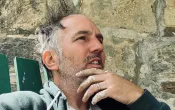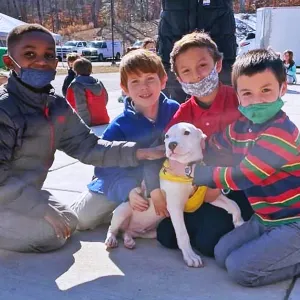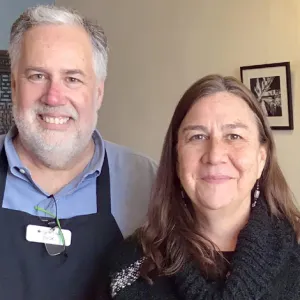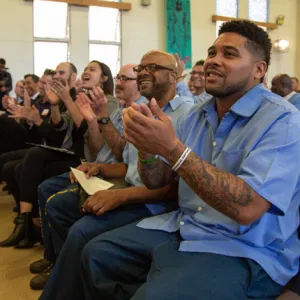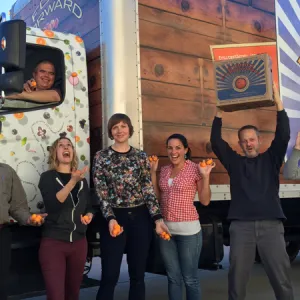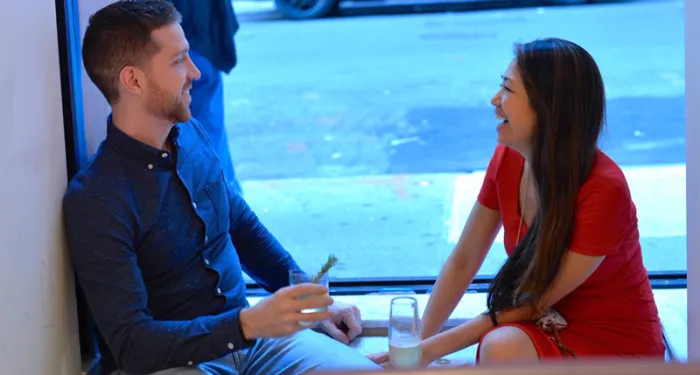
April & Graham Smith
Radical Generosity: A New Way to Look at Work and Money
Hear how April Tam Smith and Graham Smith, the founders of Times Square Restaurant P.S. Kitchen, are giving their lives away together.
I'd like to give you a little background on this episode's guests, April Tam Smith and Graham Smith.
I learned of them through a good friend, Larry Powell, who lives in Atlanta. He's someone who's both personally very generous and who's very thoughtful about generosity and its role in our lives.
He sent me an article titled, "Inspiring a Cheerful Question Mark." The focus of the article was on people who, through their generosity and their lives, raised that cheerful question: How is it possible to live a life like this?
FRANK BLAKE: Let me start where the article started, which is on the notion of reverse tithing. The article says, Graham, that after getting a lucrative job in New York you made a series of unusual life decisions that ended up with you giving away most of the money that you earned. Would you give some of the background on that? And what led you to that?
GRAHAM SMITH: Sure. So I had a professor at Wheaton College in the Chicago area who would always tell us about the golden handcuffs, where you develop such an expensive lifestyle that you actually can never quit your job. So, in effect, you're stuck. So when I moved to New York to take the job at Credit Suisse I was really conscious of that and found about five other Christian guys where we decided to all live together. I was in a bunk bed and shared a room with two other guys. So I was paying $400 a month in rent, where my other Credit Suisse analysts were paying $3000 a month for a studio across the office.
So I made the intention of living with community and living low expenses. Basically with Credit Suisse paying for your food and what not, I realized I had this surplus that I started prayerfully trying to not accumulate and give away. So at then end of the day it really came out to living on 10% and giving away 90%.
So that was the initial journey that got me started, and it was really through that that April and I, when we first met for coffee, really connected. Because she was living a similar life, both of us in finance and wanting to give our lives away together.
FRANK BLAKE: April, do you have a similar background?
APRIL TAM SMITH: It was pretty crazy when I met Graham, because separately not knowing this guys existed at that point I had already been on the trading floor in an investment bank for almost ten years. And having gone to Haiti quite a bit … At this point I've gone like 14, 15 times. My boss calls it my Ha-cation.
So one day I was leaving my Bible study. And at that point we had just gone through a series of videos from Generous Giving. I was really passionate about the organization. And this guy showed up. He didn't speak the entire night except for the one time when I started going more into Generous Giving, and he raised his hand and was like, "Wait. What is this organization all about?" Then we got coffee shortly after where we realized we were living in a very similar cloud. "You, too?" kind of way.
He shared he lived in a bunk bed with two other guys. At that point I had a single mother from Haiti and her two year old living with me in my room in addition to my roommate. And just having people in our lives and trying to be, I guess, as generous as possible. Not only your income, but with space, and resources, and emotions. I guess everything because it all belongs to God. So that was our story.
FRANK BLAKE: You are both so unassuming about your lifestyles and what you do. How do you get to the clarity on your personal mission. Because for most of us I think we hear the concept of reverse tithing and it seems so difficult and so beyond where we are that I imagine it just requires a lot charity and dedication around a mission.
APRIL TAM SMITH: Well, one thing for me is having grown up in a pretty simple home and a sense of gratitude that I know is from God. At the age of 11 I got a chance to move to the States where from my mother, at the age of 11, she started working in a clothing factory already to really support her family.
And I think when I first got a chance to go to South Africa in my mid-twenties and taking that first two weeker from my job and spending time at the orphanage, I really got to see the idea of Who and I? And who are my people that I get to give like this? When you're in your mid-twenties and you don't necessarily think you have I lot to offer. I didn't come from a wealthy family. And seeing the fruits of my gift and how much joy it gave to the kids and also really to the kids' classmates.
Because they too were very, very generous and they asked, "Auntie April, you've helped us a lot but I'd rather let's go help our friends at school. This girl had this issue. This girl's parent is struggling. Let's go help them." I think once you really get to see, it's like get to and not a have to. It really becomes just second nature.
GRAHAM SMITH: And I think on my end it's a little bit of being around the peers. Like one of my best friends lives in Ethiopia full-time the last ten years doing really meaningful work in that country. And growing up around people like that and at the same time at Wheaton getting a lot of great theology teaching. One quote sticks in my head about the materialism of Rockefeller. The quote of "How much is enough?" and his famous quote of "Just a little more" in terms of your money.
So I think that kind of set the pace of going to New York, really wanting to be wary of that "just a little more" mentality. And then thankfully, I think I met April probably a year in, 18 months into New York. And so I like to joke in our marriage she's the gas pedal, I'm the brake. In terms of how much and how radically we give.
We've been married almost five years now. So I thank God for her because she has pushed me to be consistent. We met a great time of both really exploring what does it mean to not use financial resources for ourselves, but spread it around and be open to where the needs are.
FRANK BLAKE: So, let me ask you a question. Both of you, you're in New York, very worldly environment. You've got a lot of people around you with a very, very different outlook on life. And I think one of the things embedded in that article about a cheerful question mark, is the lives you've carved out for yourselves, it's a very provocative life. It prompts a lot of questions. How do you interact with your colleagues when they ask you about the extent to which you give to others. How do you explain it to them?
APRIL TAM SMITH: It's been so fun. I think that is probably one of my favorite, favorite parts of this whole journey. I think God first led us to open P.S. Kitchen, really the idea which was, Okay, I'd love to start a business that gives away all the profits, so that it sustainably funds all these organizations we feel really passionate about. But little did I know this was going to open so, so many conversations. It was a completely unexpected side bonus. I was say literally probably once a day I would get coffee, most likely with a junior person on my trading floor in another division in my firm, that asks me these questions of How do I give more? What made you start this? How do you balance your life?
And just getting to be a resource for them in this way, of saying, "You can definitely do this." I totally see our job as not just what you do nine to five, or seven to six. It is all of you. I see myself as somebody in finance as much as somebody who owns P.S. Kitchen as much as the board chair for an organization supporting my Haiti work, etc. Because without one I wouldn't be as excited about the other.
And studies have shown that when you are passionate about your work, you're that much more productive as an employee. And you go in there with a great attitude, and hopefully with a smile. And I think that passion doesn't necessarily have to come from the work itself, it can also come from what it allows you to do.
FRANK BLAKE: Great point.
APRIL TAM SMITH: Yeah. Sometimes I come back from my Haiti trip and I'm like, "Okay. Let's trade some derivatives. Let's go."
FRANK BLAKE: Graham, how do your colleagues interact with you on this? Do you get blank stares?
GRAHAM SMITH: I think for both April and I, I don't think we say it very loudly. I think we just, naturally it comes up at different points. And so at Credit Suisse, the way April and I met actually was through the way I was living. A coworker was really curious about it. Anyways, long story short, he started coming to church with me. And loved it. Got plugged into his own Bible study at the church, at Redeemer. And it was one day after work that I said, "Well, let me come with you just to see what you got plugged into." And that was the Bible study that April was running actually.
So it was through that coworker being curious then eventually coming to the church that actually April and I connected. And that same coworker becoming curious about the work we're doing in Haiti. And we've probably had numerous coworkers come with us to Haiti.
APRIL TAM SMITH: One thing I found really cool, too, is that people are truly attracted to goodness. Not necessarily our goodness but like the things that why we're even doing this, the reason, right? None of the trips that Graham is referring to was really early on like instigated by me. It was people hearing about it and coming to me and saying, "Hey, do you think I can bring my daughter and come with you? Do you think you can help me organization a trip where I bring my kids to the big orphanage?" Or a coworker bringing his dad to serve with me because his dad is a scientist, has done some work in Haiti in the past. And it's just really cool to see how many people want in on this.
GRAHAM SMITH: And I think a concrete example is for our honeymoon we spent it in Haiti. So I think naturally people are like, "Oh, where are you going on your honeymoon?" And we'd say, "Haiti." Part of the honeymoon obviously was sitting on the beach, but the other half was actually serving in the different organizations we support. So even that little anecdote. They are like, "Wait. What?" Like why would you go to Haiti on your honeymoon? And then we get to talk about the different organizations and the things that we get excited about. It just causes them to say, "Yeah. Maybe I shouldn't spend 10K going to the Caribbean and just thinking only about myself 365, right?
FRANK BLAKE: A honeymoon in Haiti is definitely a provocative statement. That is great. That is great. So would you talk a little bit about P.S. Kitchen and story behind that because I think that's a fascinating story as well.
APRIL TAM SMITH: Sometimes we joke that has literally been our child. We signed the lease a few months after we got married. It's been a big, big part of our lives over the first few years of marriage. One thing that we already had an agreement was that in our marriage and for the rest of our lives most of our resources is going to be shared. It's going to be given away. It's going to be used for justice and impact. But what if we also combined our business background and create a place that is a place of generosity, where people would come in and hopefully be inspired. So we give away all of our profits.
But we also use our menus to highlight various organizations that we want people to know about. Often they are grassroots, small organizations that can really use the PR and just have their name be known. We also use the space to hire those are formerly incarcerated, those who have struggled with homelessness in the past, substance abuse, etc. And it's also a 100% plant based cuisine so that it's better for the environment. And, yeah, just every little corner we can find to create impact, we try to just squeeze it in.
GRAHAM SMITH: I think it's been really cool to see … You know we're in the heart of Times Square, Theater District in New York, and having, again, say a hedge fund portfolio manager have dinner there and hear the story and also be like, "Wait. What?"
It's so interesting from the physical space just different people from say, the cast of Hamilton, have come over and have been inspired. So it's fun to kind of get connected in the heart of Times Square with people getting to hear our story that says life is not about yourself and how do we think about our neighbors and those around us.
FRANK BLAKE: I hope everybody who's listening to this, whenever they visit New York, or if they're in New York, goes and eats at your restaurant. It's extraordinary just to have a restaurant that turns a profit. Does P.S. Kitchen actually work as a commercial concern?
APRIL TAM SMITH: Thank you for asking. Yeah, the first year was definitely tough. And there was a lot of prayers, lots of tears. But thankfully the last six months have been really, really encouraging. We're starting to turn a small profit. And even before we did that just the fact that, like Graham said, we have a physical space and also people start to really, first ask questions, then they get inspired because of the space.
We've been able to give away more than we can imagine from even a personal income side. So what I mean by that is Graham and I continue our giving outside of P.S. Kitchen and we meet more and more people that hear about the stories and know some of the details and the numbers that we've gone in on the space, and how much we have personally sacrificed to make this happen. Then you have a conversation that's something like, "Wait. What? Why would you do this?" And once it is explained then they kind of come alongside us to give also probably in a way that was more than they initially would have thought or imagined.
GRAHAM SMITH: One of my favorite stories of P.S. Kitchen is us being able to hire someone with a previous incarcerated background where he had gone to many, many jobs and gotten declined because you have to check that box that says, "I have a prison background." And us being able to hire him. Him being able to work for us. Literally when we gave him the offer, went outside P.S. Kitchen and started crying because no one had given him a second chance since he'd been in prison for 20+ years.
So I think in those small ways you're also encouraged by those stories of getting to actually meet these people and be a part of their lives. And then I think beyond that just being a part of a community here in New York that are open to talking and thinking about it together.
FRANK BLAKE: Do you both have a blog or a social media presence where people can follow you, or gain insights from your mission and the clarity of what you're doing? Or do you have one that you'd recommend to others?
APRIL TAM SMITH: I think following us on Facebook is probably the best. It's just PSkitchenNYC. We have a few stories there, like the one that Graham has just shared, with our different staff who have been really happy to share their experience. And, yeah, just come and learn more about us.
FRANK BLAKE: So for people who listen to this, and one of the reasons why I'm so thrilled to have you on this podcast is your life is one series of Crazy Good Turns. It's one Crazy Good Turn after another. And for a lot of folks, and I include myself, it's really … The things you do as a matter of course are really difficult to get to. Do you have advice, something that you say to people who look and admire and respect what you do, but are anxious? What advice do you give them?
GRAHAM SMITH: I think being in New York there's a lot of comparison. There's a lot of FOMO, if you're missing out. There's a type of anxiety that lives in New York City. And so I think practically I like to think of the phrase, "The secret to living is giving." So really getting outside of yourself. I think a lot of the anxiety can also be when you get stuck in your head, you're dead kind of idea.
And so something simple as a couple of blocks away there's an organization called Back on My Feet, where Monday, Wednesday, Friday you wake up at 5:30, and you go running with people that are currently in the homeless shelter there at the Bowery Mission. And so through that running, I try to go once a week, you get to actually hear people's stories of either this happened or that happened. But you build friendships with them.
And so I really think just practically getting outside of yourself and looking towards others and not always having to climb the corporate ladder, always compare yourself, but really having that moment of, How can I give back? Who are my neighbors? How can I participate in looking after someone else? And I think that kind of frees you from some of that, at least New York City anxiety around trying to keep the pace with everything that's going on.
APRIL TAM SMITH: That brings up a really good point I actually often also shared is this idea of habit. You know Graham also since marriage got me a little bit into. And just this idea of every little thing that we do really matters, of character, generosity, honesty, integrity etc.
So I think often we might end up being asked the question of, "Wow. How did you start this restaurant in Times Square?" But it really, to Graham's point, started at the age of 21, 22 mentoring up in the Bronx, and slowly going to South Africa, and slowly going to Haiti. It's been a journey and the intention was never to end up to start this restaurant. It was kind of just one step at a time. And I think once you get to experience and have that inside of you, it's really hard to get rid of.
FRANK BLAKE:That is so awesome, and I can't thank both of you enough for participating. You are almost definitionally leaders in Crazy Good Turns. And thank you so much for both your story, the journey you've taken, the journey you're going to continue to take, and the advice you've given.
Our guests in this episode, Graham and April Tam Smith, were the first featured example. They are a young couple living in New York City, where they've been married for the past five years. And during that time, they've done a tremendous amount of good.
The latest, and largest, example is their restaurant P.S. Kitchen, located in Times Square. Several things about the restaurant make it special: It gives all of it's profits to charity. It hires people who need a second chance in life, whether that be due to a prior conviction on their record or another past issue they're trying to surpass. And the restaurant's menus and other materials are all designed to bring awareness to worthy causes around the globe.
But the Smiths giving started well before P.S. Kitchen opened its doors. As you'll hear in this episode, soon after marrying, the two spent their honeymoon in Haiti, where they did volunteer work. When the couple first met, Graham was sleeping on a bunk bed even though his salary would have allowed him to afford something far greater, because he was giving away the majority of it — a practice known as reverse tithing. April was giving away a lot too with the help of an organization called Generous Giving.
When I first read about the Smiths and how they are living their lives to help others, I thought, "Wow. We cannot have enough features about people like Graham and April. It's just impossible to recognize and celebrate them enough."
In this interview, you'll find how these two exceptional people go so far outside the norm to do good for others. You can listen to it on Apple Podcasts, Spotify, Stitcher, Overcast, or stream it directly here.
Lastly, I'd love to hear from you after you listen. What's a cause close to your heart that you'd like to give more to? Tell me in the comments below.
